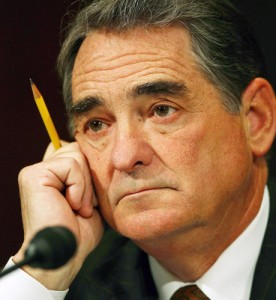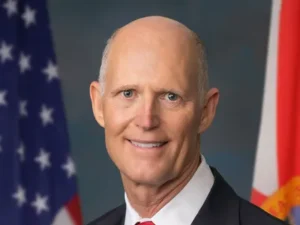This article was originally published in 2014 and updated on July 10, 2024. Some things never change.
One of the most significant and constant themes of the Project 2025 manifesto from the Trump MAGA right is its focus on dismantling the administrative and regulatory state and replacing it with MAGA loyalists who will cut regulations, quality standards, and prosecutions for regulatory and law violations.
If the past is any indicator, the fraudsters will go after the nation’s lucrative and federally subsidized healthcare system, specifically Medicare and Medicaid.
While Republicans have targeted these programs and its successor, the Affordable Care Act(AKA Obamacare) for years, this critical element of U.S. healthcare practices has been less noticed: Medicare fraud and its substantial financial impact on the economy.
According to Bloomberg News, Medicare fraud costs taxpayers an estimated $800 billion annually. This includes false claims, overcharges, networks of doctors and hospitals over-inflating bills, and billing for services that were never delivered.
Medicare fraud is a long-established crime. It exists locally, with shady doctors and medical technicians submitting fake paperwork. It also exists in Congress with corrupt senators, such as ex-Republican Senator and former Florida Governor Rick Scott, as well as Republican Senator Billy Taurzin of Louisiana, Republican House Speaker Newt Gingrich, and Democrat Connecticut Senator Joe Lieberman’s wife, who all made money from the very generous health care lobbyists to deliver favorable treatment for the health care and pharma companies.
This fraud exists at all state and federal levels. It consists of legislatively allowed and legal overcharges by pharmaceutical companies and hospitals, which can charge prices immune to bulk purchase discounts and price negotiations. All of this results from the Medicare Prescription Drug Bill enacted in 2003, one of the most significant healthcare scams ever perpetuated on taxpayers. Billy Tauzin shepherded the bill through Congress. It was so controversial that two of his fellow Congressmen accused him of using unethical practices to advance a bill written by pharmaceutical industry lobbyists. (For more on Tauzin, see below.)
For investors, institutionalized fraud, in its various forms, presents a great investment opportunity, but one that can also carry even higher direct costs to some with medical conditions severe enough to warrant hospitalizations or costly, long-term treatments. This means that any gains in individual issues, such as hospitals, pharmaceuticals, and healthcare companies, can easily surpass individual medical bills inflated due to institutionalized fraud practices.
Then, there is an even greater societal cost since U.S. taxpayers are paying for a healthcare system that under-delivers quality care compared to other developed nations around the world while charging some of the highest costs in the world for comparable services.
When combined, Medicare fraud, in its broadest sense, negatively affects all Americans, regardless of race, economic status, and political beliefs. Yet, it has continued for decades and is now a permanent feature of the healthcare industry and continues to evade serious enforcement.
Like the decades-long discussion about border enforcement and the so-called war on drugs, Medicare fraud persists because certain people and corporations profit from these practices and constantly work to prevent them from being curtailed. This fraud is so ingrained that it has become part of the establishment politics that dominate the national healthcare debate. As a result, aside from a few insider beneficiaries, the entire nation suffers.
Here are some specifics about Medicare fraud, its national impact, and why it is a double-edged sword to healthcare industry investors, who think they are making a portfolio profit on one hand and often losing more when paying individual medical bills.
What Medicare Fraud Costs the Nation
Medicare and Medicaid expenditures account for 22% of the Federal budget, according to the Congressional Budget Office in its fiscal year 2013 report. The federal government spends about $1 trillion annually on health care, which subsidizes almost everyone who receives medical insurance, privately or publicly, including those who receive medical benefits via an employer-sponsored plan.
The problem with the nation’s healthcare system is that it has evolved piecemeal over time and consists of various private plans and individuals who moved from private to public plans, such as Medicare and Medicaid. Coverage varied widely across the nation as each state’s insurance commissioners (many of which are very cozy with those they regulate) allowed insurers to rank applicants through an underwriting process or a rating system that based premiums on age, sex, and health status.
Based on this process, only about 73% of applicants (on the high end) received insurance. At the same time, the rest were disqualified because they filed to meet the standards or had pre-existing conditions, according to author Edward Kleinbard. Of those who received coverage, about 33% paid above-average premiums, as well as high co-pays and deductibles (over $5,000 annually) since they were part of Preferred Provider Organizations (PPOs), based on 2008 industry data, as cited by Edward Kleinbard in his book, We Are Better Than This.
Before the Affordable Care Act (ACA), workers under 65 primarily relied on employer-sponsored health care plans and federal subsidies. It is not politically correct in Republican circles to acknowledge that federal subsidies are essential to the healthcare system since they are part of business tax credits applied to employee compensation.
Specifically, the cost of health care premiums in employer-sponsored plans is considered tax-exempt for income and payroll tax purposes. This subsidy costs the Treasury about 9% of its revenues over the next ten years, according to the CBO in 2013. The problem is that healthcare costs have risen faster than inflation. This is because people think their coverage is “free” due to Medicare fraud or unrestrained illicit billing.
Origins of the Fraud
The U.S. healthcare system is more akin to the Wild West than the highly regulated market conservatives like to think. There are over 40 large medical insurance providers, mostly insurance companies, nationwide, and this does not include the Veterans Administration, Medicare, and Medicaid. In turn, the insurance companies buy medical services from PPOs and HMOs, which are then marketed to individuals, often without competitive pricing.
Without competition, insurance companies have no incentive to fight price increases charged by hospitals and medical groups since they pass those higher rates to employers and their unsuspecting employees.
The Benefits of the Affordable Care Act (ACA)
Despite the hysteria surrounding the ACA, the Congressional Budget Office in 2012 estimated that changes to the nation’s health care system as contained in the ACA would cut the federal deficit by $100 billion over the next decade by charging new taxes as a result of expanding coverage to 25 million Americans, according to Kleinbard.
The ACA also contains provisions that buttress the financial stability of Medicare Part A (hospital services), which will become more evident in the long term, Kleinbard said. The ACA also seeks to inject competition into the national insurance system, which was lacking before, especially in less populated, poorer areas.
What Medicare Fraud Costs Individuals
Fraud and inefficiency are the hallmarks of the nation’s healthcare system that have long gone uncorrected. A recent Bloomberg News article said that $800 billion is wasted annually on managing the U.S. healthcare system—instances of waste of ordinary. For instance, a RAND study (Health Affairs, 2009, as cited in Kleinbard) calculated that dealing with an insurance company costs each doctor about $68,000 annually. Another study by the New America Foundation, 2013, found that $100 billion to $400 billion is wasted on administrative costs alone to deal with insurance companies.
The Institute of Medicine said, according to Bloomberg News, that $765 billion, or about 30 cents per dollar spent on health care in 2009, was wasted on high prices, inefficiencies, high administrative costs, and poor preventative medical practices.
How Medicare Fraud Hurts the Nation
Opponents of health care reform have railed against socialized medicine in other nations and often cite the long waiting periods that people must endure before they receive needed treatment. But as one of the world’s most economically developed nations, with one of the world’s most expensive healthcare systems and the world’s largest per capita medical spending, the U.S. has done a poor job of delivering quality services compared to the dollars spent.
The National Academy of Sciences in 2013 (as cited in the U.S. Health in International Perspective) found that the U.S. spends more than about 30 other nations yet ranks seventh from the bottom in terms of life expectancy. The U.S. also ranks high in the number of people who die from infectious diseases, has the worst infant mortality rates, most obese children, highest rate of diabetes, and the most significant number of citizens susceptible to cardiovascular diseases. This is even though the U.S. spent more than any other nation, about 18% of GDP in 2013, according to the OECD, than ten other OECD nations. This includes $8,508 spent on health care per person annually, according to the OECD in 2010. Worse, this enormous amount of money has not translated into a healthier nation.
How Medicare Fraud Affects Individuals and Families
My wife died of leukemia after a six-year about with endometrial cancer. I visited cancer hospitals in Seattle, Sacramento, and Tampa. Yet, it was in the last six weeks of her life, when she was in intensive care at Morton Plant Hospital in Clearwater, Florida, that I saw Medicare abuse firsthand.
This abuse consisted of unnecessary tests administered at all hours of the day and night, unnecessary visits from non-relevant doctors who stopped in for a chat or minor exam, the prescription of unnecessary and expensive medicine, including a $6,000 a month prescription for a rare infectious disease from a contagious disease doctor (she had leukemia which is not communicable), as well as other unnecessary intravenous fluids.
The most telling example was when she requested to be released from Morton Plant a few days before hospice, the chief intensive care attending physician said he wanted to keep her for a few extra days for “observation.” At the time, she was terminal, and any “observation” was unnecessary, except for the expense of charging Medicare for the room.
At a subsequent bereavement group in Clearwater, Florida, I heard similar stories from other widows and widowers, including one from a woman whose husband was brain dead yet had to be submitted to four more brain scans, which only confirmed what the first one did. I spoke with doctors who told me they would never allow a loved one to be in any hospital unless they were accompanied by another family member 24 hours a day to prevent the administration of invasive, painful, and unnecessary tests on another loved one.
From my experience, the facilitator for Medicare fraud inside the hospital can be directly tied to hospitalists, a relatively new category of doctors who work for the hospital. While the polite definition of a hospitalist is that they act as a liaison with the family to keep them informed about the treatment and prognosis of their loved one, I only met my hospitalist for about one minute, who did not provide me with any information.
Instead, I believe she existed to let other doctors know that a new patient was admitted to the hospital and that they were now fair game to be visited by any other doctor on the hospital staff, including an infectious disease doctor who had no reason to visit my wife so that they could submit a bill to Medicare. This explains why I received a 33-page Medicare bill for my wife last week or so at Morton Plant Hospital in Clearwater, Florida, even though her main leukemia doctor told her to go home “because the doctors do not understand her disease (leukemia).”
In this personal observation, I saw doctors who knowingly violated their stated oath to “not harm” as they pursued the fees from Medicare and submitted my wife to unnecessary pain and suffering.
Medicare Fraud Affects Everyone
Medicare fraud is so lucrative that it is ingrained into the political culture. Even though this fraud affects old and young, all races, and all political parties, it remains persistent because it is not seriously punished. Not only is the fraud in all forms, legal and illegal, a national disgrace, but it has also involved unethical Congressional conduct from legislators who knowingly abused their power to gain better-paying jobs in the private sector.
Here are three great examples of how lucrative Medicare fraud is and how its perpetrators can commit it while remaining outstanding members of the political and business communities.
As quoted from Bloomberg News, The poster boy for this duplicitous conduct is former Congressman Billy Tauzin (R-Louisiana), who became chief lobbyist for the pharmaceutical industry trade association.

“Billy Tauzin, the former congressman turned pharmaceutical industry lobbyist, was paid $11.6 million in 2010, the year he brokered a deal with President Barack Obama that helped pass the health-care overhaul.
“After the law was signed, Tauzin left his job as head of the Pharmaceutical Research and Manufacturers of America, or PhRMA, as the highest-paid lobbyist among groups most involved in the overhaul debate. Karen Ignagni, leader of the insurer lobby, was paid $1.5 million in 2010 while Tom Donahue at the Chamber of Commerce made $4.8 million, tax records show.”
Tauzin’s betrayal of Americans costs the nation billions in higher prescription costs, and, despite rhetoric about the benefits of free competitive markets, relies on monopoly, non-competitive pricing to lock in profits to the pharmaceutical industry. No other developed country allows its pharmaceutical industry to practice predatory pricing on its own citizens, but it is allowed in the U.S.

Similarly, former Republican presidential candidate and U.S. House Speaker Newt Gingrich grossed $55 million from 2001 to 2010 for consulting services and memberships in a health-policy center he ran. This shows that Medicare fraud is big money for the right people. Gingrich is now a CNN commentator.
Florida Governor Rick Scott amassed his personal fortune as the CEO of Columbia-HCA, which grew into a hugely profitable hospital network. By 1994, his company had over 340 hospitals, 135 surgery centers, and 550 home health locations, with 285,000 employees.
Scott resigned as CEO in 199. That was the same year federal agents announced their investigation into the company. “In time, it became apparent that the investigation focused on whether Columbia/HCA bilked Medicare and Medicaid for tests that were not necessary or ordered by physicians, and for attaching false diagnosis codes to patient records to increase hospital reimbursement,” according to Politifact.com.

To show the scope of the investigation, the U.S. Justice Department announced “the largest government fraud settlement in U.S. history when Columbia/HCA agreed to pay $840 million in criminal fines and civil damages and penalties. Among the revelations from the 2000 settlement, which all apply to when Scott was CEO, were that Columbia overbilled Medicare for unnecessary tests and false diagnosis codes,” according to Politifact.com. In a second series of similar penalties against Columbia/HCA in 2002, the Feds received an additional $881 million. This brought the total fine against Columbia-HCA to $1.7 billion.
Since corporations are people, Columbia-HCA agreed to plead guilty as part of the 2000 settlement, but Scott, an actual human being, was never indicted. In his court testimony, he said he could not recognize his signature on corporate documents. Still, Scott kept his fortune and was elected governor of Florida, which has a vast Medicare-Medicaid constituency, for two successive terms.
How To Stop Medicare Fraud Tomorrow
While Federal authorities continue to investigate Medicare and Medicaid fraud nationally, there is a more direct way to stop fraud at the very locations where it occurs. This can be done by granting nurses ironclad whistle-blower protection status to inform authorities about unnecessary tests they are often asked to administer in hospital and doctor’s office settings. From my experience, nurses are better informed about the impact and need for procedures and, more importantly, have a very different financial incentive than doctors and hospitals.
Since they have no financial incentive to administer unnecessary tests and procedures on patients, nurses should be able to question why a specific test is needed openly. It is worth noting that it was a nurse at Texas Health Presbyterian Hospital in Dallas who alerted the public that there were professional and cultural lapses that put nurses and the public in danger of EBOLA. These lapses by the hospital would probably never have become public if it were not for the nurses. (See story on this website.)
Nurses have pulled me aside and told me to remove a loved one from a hospital or that a certain test was unnecessary. However, due to the medical hierarchy, these nurses risked censure or termination if anyone heard them voice their informed opinions. In these cases, the medical culture fosters fraud in the form of unneeded tests and expenses that serve no purpose and subject uninformed patients to unnecessary pain and suffering. Give the nurses whistle-blower protections or access to a confidential national hotline.
How Investors Can Benefit from Medicare Fraud
Of course, suggesting that investors can benefit from Medicare fraud is very cynical, but sadly, it happens daily. Shareholders of Columbia-HCA certainly did until the firm was eventually fined. Similarly, investors can purchase healthcare ETFs, and some of the companies listed in those ETFs benefit from charging high costs to patients and, indirectly, to taxpayers.
However, this type of investing also carries substantial social costs that can easily outweigh any individual portfolio gains. For example, if an investor makes $5000 by investing in a healthcare company that benefits from Medicare fraud but then incurs an $8,000 hospital bill that incorporates the cost of Medicare fraud, that portfolio profit should be reduced to reflect the cost of the scam. Of course, this would be a slight reduction unless the fraud also translates into diminished quality of medical services.
And based on OECD studies cited earlier in this story, that is undoubtedly the case in the U.S. But in economics and investing, that diminished quality would be considered an externality unless, of course, it directly affects your health treatment. Then, it becomes personal, not some abstract concept.
As a result, the optimal way to benefit from Medicare fraud is if the investor resides outside of the U.S. Citizens of the UK, Switzerland, France, Canada, Norway, or Germany, for example, which have variations of a single-payer-private health insurance systems, could pocket any portfolio profits, yet still enjoy the better-quality medical care in their own countries. In these instances, they could avoid the social costs and pocket the profits, less taxes, and currency conversion costs.
This is why institutionalized fraud is a good investment for those who directly deliver health care in the U.S. This system dominates corporations in the military-industrial, agricultural, pharmaceutical, oil, research, and scientific sectors, which all receive substantial federal subsidies. Yet executives in these industries are not the ones who rail against big government and federal overreach. The reason is that they are beneficiaries of federal donations and benefit from federal inefficiency and poor financial oversight.
So, while investors can reap profits in an isolated healthcare portfolio, as a nation, this institutionalized fraud reduces the standard of living for everyone and for generations to come. Here’s to your health.











